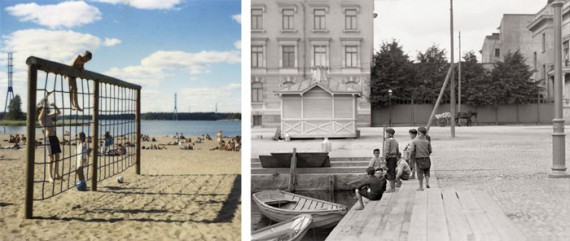Search results for "ilpo tiihonen/Ilpo Tiihonen"
Worlds apart
18 June 2009 | Extracts, Non-fiction

Helsinki boys by the sea: in Martti Jämsä’s Polaroid lads play on the beach; in I.K. Inha’s photograph (Hietalahden satama, ‘Hietalahti harbour’), taken a century earlier, barefoot urchins meet up on the quayside
A hundred years ago the photographer I.K. Inha (1865–1930) was asked to illustrate a tourist guide to Helsinki. He took some 200 photographs, of which some 60 were included in the book, which was published by WSOY in 1910. In his new book of photographs, OPS! Helsinki Polaroid¹, Martti Jämsä (born 1959), wanders the same streets a century on, taking snapshots with his Polaroid camera. More…
Speaking about the heart
30 June 1991 | Archives online, Articles
New Finnish poetry, translated and introduced by Herbert Lomas
The ‘modernist’ revolution in Finnish poetry is now 40 years old, and the art must be ripe for changes.
Of course, the modernism of post-war Finnish poetry was not – except in Haavikko and to some extent in Saarikoski – extremely modernist. The poets were more interested in their content than their experiments. They were perhaps closer to ancient Chinese poets and early Pound than to Eliot in their elided brief juxtapositions and meditations on nature, society and moment-to-moment transience. The poets picked up a few liberties that unshackled them from metrical and rhyming formalities uncongenial to Finnish stress, syntax and phonemics; and they took off to speak about the heart. That is the strength of this poetry, and its originality, since all originality consists in being oneself – which includes one’s national self, and ultimately other people’s selves. And every generation still has to make a new start, admittedly in new circumstances, with the experience of its forefathers from birth to death. More…
I was born here
31 March 1997 | Archives online, Fiction, poetry
Poems, introduction by Ilpo Tiihonen
Bloggs
You work eight hours a day,
sleep thirteen.
Three hours are gone in eating
and telling dirty stories by your bed.
When they say, ‘If only you’d
read something, mate –
you’re dribbling your life away,’
back you come with:
‘Living like this 1 make everything mine.’
Bloggs, Bloggs,
should the world be changed for you?
From Tie pilven alta ('The way out of the cloud', 1939) More...
On the waves of our skin
4 December 2009 | Fiction, poetry
The poems in Ilpo Tiihonen’s new collection, Jumalan sumu (‘God’s mist’) – about fakirs, beggars, poets, lovers and life – are tinged with a gentle sense of the ephemerality of human life (see Gatecrashing the universe)
Poems from Jumalan sumu (‘God’s mist’, WSOY, 2009)
SANTO PAN
These mornings when beggars
station themselves at church doors
and a little grace slips through
the fingers of some of us,
it seems for a moment good
That crows are flying about
and princes’ bones are clattering in huge sarcophagi
And now, with a basic shape planned
for the daily bread,
Early morning wakes up in Florence
with black flour in its fingernails More…
Burnt orange
30 September 1992 | Archives online, Drama, Fiction
Extracts from the play Poltettu oranssi (‘Burnt orange‘): ‘a ballad in three acts concerning the snares of the world and the blood’. Introduction by Tuula Hökkä
The scene is a small town in the decade before the First World War
Cast:
DR FROMM
an imperial,bearded middle-aged gentleman
ERNEST KLEIN
a moustached, ageing, slightly shabby leather-manufacturer
AMANDA KLEIN
his wife, well-preserved, forceful, angular
MARINA KLEIN
their daughter, shapely, withdrawn, wary
NURSE-RECEPTIONIST
open, direct, not too ‘common’
ACT ONE
Scene two
After a short interval the receptionist opens the door and ushers Marina Klein into the surgery. Exit the receptionist. Marina immediately goes to the end of the room and presses herself against the white wall. The white surface makes her look very isolated in her ascetic black dress. The Doctor, who now appears to be headless – an impression produced by the lighting and the yellowish background – half-turns towards her. More…
